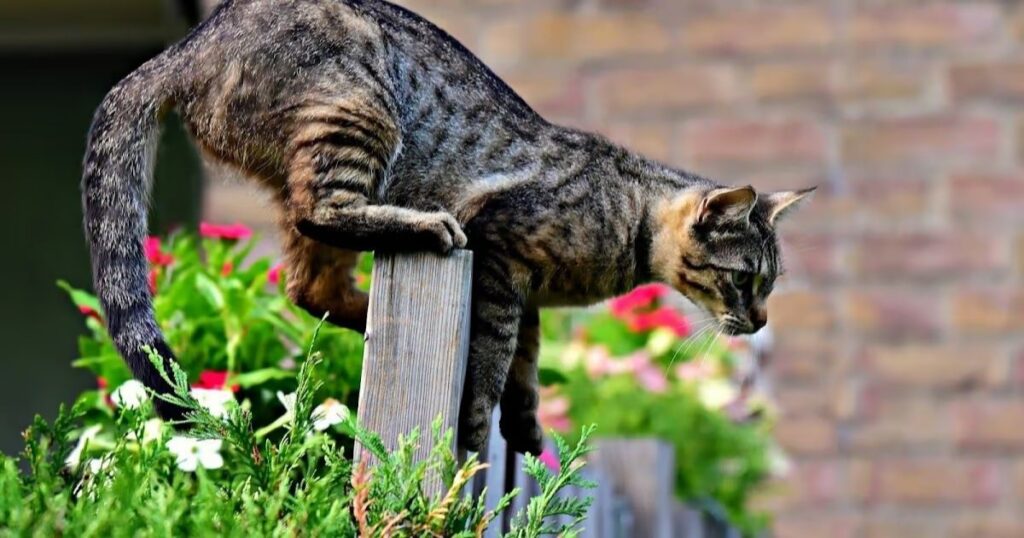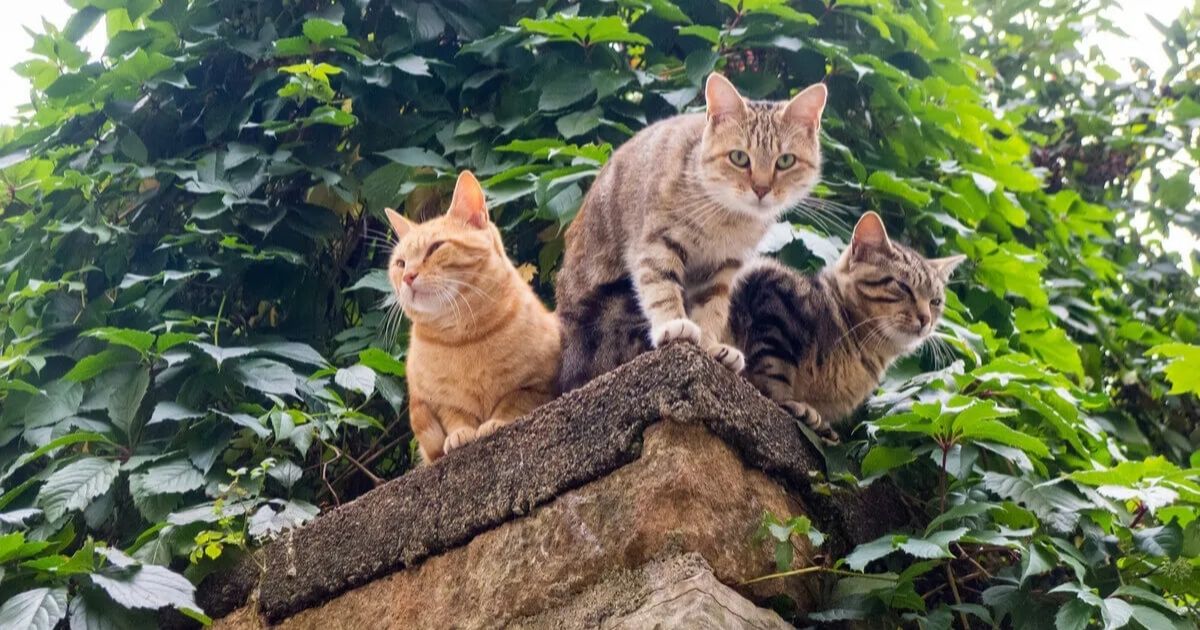Cats can be adorable companions, but when they venture into our gardens, they can become a nuisance. Whether you’re dealing with neighborhood felines or your outdoor cat, finding ways to protect your garden is essential. This comprehensive guide will explore various humane methods and natural deterrents to keep cats out of your garden, ensuring your plants remain safe and your outdoor space stays clean.
Looking for humane ways to keep cats out of your garden? Find out more in our guide.
Keeping cats out of your garden doesn’t have to involve harsh or cruel methods. There are numerous cat-friendly techniques and eco-friendly methods that can effectively deter felines from entering your outdoor space. Before we delve into these strategies, it’s crucial to understand the legal aspects of dealing with cats in your garden.
Know the law
When it comes to outdoor cat control, it’s essential to be aware of local laws and regulations. In many places, cats are allowed to roam freely, and harming them is illegal. Always opt for humane methods of deterrence rather than resorting to harmful tactics. If you’re dealing with a persistent problem, consider contacting your local animal control or speaking with your neighbors about keeping their cats indoors.
How to deter cats naturally
Natural deterrents are an excellent way to discourage cats from entering your garden without causing them harm. These methods often rely on cats’ sensitive noses and their dislike of certain textures or scents. Here are some effective natural techniques for garden protection:
- Citrus peels: Scatter orange or lemon peels around your garden.
- Coffee grounds: Sprinkle used coffee grounds in your flowerbeds.
- Herb gardens: Plant herbs like rosemary, lavender, or rue, which cats tend to avoid.
- Prickly plants: Incorporate plants with thorny stems or rough textures in your garden design.
Other ways to keep cats out of your garden
In addition to natural deterrents, there are various other cat repellents and deterrent techniques you can employ:
Also read this post:bring food into Busch Gardens
- Physical barriers: Install fencing or netting around your garden.
- Motion-activated sprinklers: These can startle cats and keep them away.
- Ultrasonic devices: These emit high-frequency sounds that deter cats but are inaudible to humans.
- Repellent sprays: Use commercial cat repellents or make your own using natural ingredients.
How can I stop cats pooping in my garden?

One of the most frustrating aspects of cats visiting your garden is dealing with their waste. Here are several strategies to prevent cats from using your garden as a litter box:
1. Clean up
Regularly remove any cat feces from your garden. Cats are attracted to the scent of their previous visits, so keeping the area clean can discourage them from returning.
2. Rough ground
Cats prefer soft, loose soil for digging. Make your garden less appealing by covering exposed soil with
- Pebbles or gravel
- Pine cones
- Chicken wire laid flat on the ground
3. Keep flowerbeds watered
Moist soil is less attractive to cats for digging. Regular watering can help deter them from using your flowerbeds as a toilet.
4. Sounds
Cats have sensitive hearing, and certain sounds can keep them at bay. Consider using:
- Wind chimes
- Bells
- Motion-activated noise makers
Pestbye Cat Repellent
The Pestbye Cat Repellent is an ultrasonic device that emits high-frequency sounds to deter cats. It’s an effective and humane way to keep cats out of specific areas of your garden.
5. Create a cat-friendly zone
Designate a small area of your yard for cats to use. Fill it with loose, sandy soil and keep it away from your prized plants. This can help redirect cat behavior to a more acceptable location.
6. Obstacles
Make it difficult for cats to access your garden by:
- Installing trellis or lattice along fences
- Using prickly plant cuttings as a barrier
- Placing large rocks or decorative stones in flowerbeds
7. Pungent plants
Certain plants can act as natural cat repellents due to their strong scents. Consider planting:
- Coleus canina (also known as the “Scaredy Cat Plant”)
- Lavender
- Lemon thyme
- Pennyroyal (note: toxic to cats if ingested)
8. Other smells
Cats dislike various scents that can be used as deterrents:
- Citrus oils
- Vinegar
- Commercial cat repellents
- Essential oils (use with caution, as some can be harmful to cats)
9. Keep bird food off the ground
Birds can attract cats to your garden. If you enjoy feeding birds, use elevated feeders and clean up any spilled seeds promptly.
10. Plant closely together
Dense plantings make it difficult for cats to navigate through your garden. Consider:
- Companion planting
- Ground cover plants
- Closely spaced shrubs or perennials
11. Get a dog
While this might not be a solution for everyone, the presence of a dog can deter cats from entering your garden. Just ensure that any interactions between dogs and cats are supervised and safe.
12. Water pistol
A harmless spray of water can startle cats and discourage them from entering your garden. Be consistent with this method for the best results.
13. Sprinkler sprays
Motion-activated sprinklers can provide a startling but harmless deterrent for cats. They’re also beneficial for watering your garden.
Pestbye PestBye® Jet Spray Battery Operated Motion Activated Cat Scarer & Repellent – Animal Repeller
This device combines motion detection with a jet of water to scare away cats and other garden pests. It’s an effective and humane way to protect your garden.
14. Shoo
Sometimes, the simplest method is the most effective. If you catch a cat in your garden, a firm “shoo” or clap of the hands can be enough to send them on their way.
Understanding Cat Behavior for Better Garden Protection

To effectively keep cats out of your garden, it’s helpful to understand their behavior. Cats are naturally curious and territorial animals. They may be attracted to your garden for various reasons:
- Hunting: Gardens often attract birds, mice, and other small prey that cats instinctively want to chase.
- Exploration: Cats love to investigate new areas and may see your garden as an exciting territory to explore.
- Comfort: Soft soil in flowerbeds can be attractive for cats looking for a place to relieve themselves.
- Shelter: Dense shrubs or structures in your garden might provide a cozy hiding spot for cats.
By understanding these motivations, you can tailor your deterrent strategies more effectively. For example, if cats are visiting your garden to hunt, focusing on keeping bird feeders away from the ground and securing any potential prey habitats could be particularly effective.
Combining Methods for Maximum Effectiveness
When it comes to garden pest control, especially regarding cats, a multi-faceted approach often yields the best results. Combining several of the methods mentioned above can create a more robust defense against feline intruders. Here are some effective combinations:
- Physical barriers + scent deterrents: Install a fence around your garden and supplement it with strongly scented plants or essential oils along the perimeter.
- Sound devices + texture deterrents: Use an ultrasonic repellent device in conjunction with rough ground coverings like pine cones or pebbles.
- Natural repellents + motion-activated deterrents: Plant cat-repelling herbs and flowers while also installing a motion-activated sprinkler system.
- Cat-friendly zone + obstacle course: Create a designated area for cats away from your main garden, and make the path to your prized plants difficult with physical obstacles.
By layering these techniques, you create multiple lines of defense against cats, making your garden less attractive and more challenging to access.
The Importance of Consistency in Cat Deterrence
Whichever method you choose to keep cats out of your garden, consistency is key. Cats are creatures of habit, and it may take time for them to change their behavior. Here are some tips for maintaining a consistent approach:
- Regular maintenance: Keep up with your chosen deterrent methods. Refresh scents, maintain physical barriers, and ensure electronic devices are functioning properly.
- Patience: Don’t get discouraged if you don’t see immediate results. It can take several weeks for cats to change their routines.
- Adaptation: Be prepared to adjust your strategies if cats seem to be overcoming certain deterrents. What works for one cat may not work for another.
- Year-round protection: Remember that cat activity in your garden may change with the seasons. Be prepared to adapt your methods accordingly.
- Neighborhood cooperation: If possible, work with your neighbors to implement cat deterrent strategies across multiple properties for broader effectiveness.
Eco-Friendly and Sustainable Garden Protection

As we become more environmentally conscious, it’s important to consider the ecological impact of our cat deterrent methods. Here are some eco-friendly approaches to keeping cats out of your garden:
- Native planting: Use native plants that naturally repel cats. These plants are often better adapted to your local climate and require less maintenance.
- DIY repellents: Create your natural repellents using ingredients like citrus peels, coffee grounds, or vinegar instead of commercial chemical sprays.
- Sustainable barriers: Opt for bamboo or recycled plastic fencing materials when creating physical barriers.
- Water conservation: If using sprinkler systems as deterrents, consider connecting them to a rainwater collection system to minimize water waste.
- Companion planting: Utilize companion planting techniques to create dense, cat-resistant garden areas that also benefit your desired plants.
By choosing eco-friendly methods, you not only protect your garden from cats but also contribute to a healthier environment overall.
When to Seek Professional Help
While most cat problems in the garden can be handled with DIY methods, there may be times when professional assistance is necessary. Consider contacting a professional if:
- You’ve tried multiple deterrent methods without success.
- The cat problem is severe and causing significant damage to your garden.
- You suspect the cats visiting your garden may be feral or in need of medical attention.
- There are legal complications involving neighborhood cats.
Animal control experts, professional gardeners, or local cat welfare organizations may be able to provide additional guidance and solutions tailored to your specific situation.
Conclusion: Creating a Harmonious Garden Environment
Keeping cats out of your garden doesn’t have to be a constant battle. By employing a combination of humane methods, natural deterrents, and understanding cat behavior, you can create a garden that’s both beautiful and protected. Remember to be patient, consistent, and willing to adapt your strategies as needed.
Ultimately, the goal is to create a harmonious environment where your garden can thrive without causing harm or undue stress to local feline populations. With the right approach, it’s possible to enjoy your outdoor space while coexisting peacefully with the cats in your neighborhood.
By implementing these cat-friendly methods and garden protection strategies, you’ll be well on your way to maintaining a cat-free garden that you can enjoy year-round. Remember, the key to success lies in finding the right balance of deterrents that work for your specific situation while always prioritizing humane and eco-friendly solutions.
Would you like me to explain or break down any part of this article further?
FAQs:
How can I stop cats pooping in my garden?
To stop cats from pooping in your garden, regularly clean up any existing waste and make the soil less appealing for digging. You can cover exposed soil with rough materials like pebbles or pine cones, and keep your flowerbeds well-watered, as cats prefer dry, loose soil for their business.
How do I keep cats away from my garden?
You can keep cats away from your garden by using a combination of physical barriers, scent deterrents, and sound-based repellents. Consider installing fencing or netting, planting cat-repelling herbs, using motion-activated sprinklers, or employing ultrasonic devices that emit high-frequency sounds cats dislike.
What is the most effective cat repellent?
The most effective cat repellent often varies depending on the individual cat and situation, but many gardeners find success with motion-activated sprinklers or ultrasonic devices. These methods startle cats without causing harm and can be particularly effective when combined with other deterrents like scent-based repellents or physical barriers.
What smell do cats hate?
Cats typically dislike strong citrus scents, such as lemon, orange, or lime, as well as the smell of certain herbs like lavender, rosemary, and rue. They also tend to avoid the scents of vinegar, coffee grounds, and some essential oils, though it’s important to use essential oils cautiously as some can be harmful to cats.











